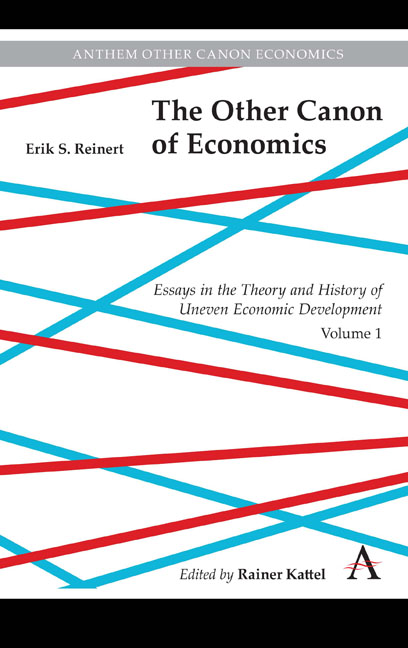Book contents
- Frontmatter
- Dedication
- Contents
- Introduction
- Chapter 1 Catching-up from Way Behind. A Third World Perspective on First World History
- Chapter 2 Recent Trends in Economic Theory — Implications for Development Geography
- Chapter 3 A Schumpeterian Theory of Underdevelopment - A Contradiction in Terms?
- Chapter 4 Competitiveness and Its Predecessors - A 500-Year Cross-national Perspective
- Chapter 5 Diminishing Returns and Economic Sustainability: The Dilemma of Resource-based Economies under a Free Trade Regime
- Chapter 6 Economics: ‘The Dismal Science’ or ‘The Never-ending Frontier of Knowledge’? On Technology, Energy and Economic Welfare
- Chapter 7 Production Capitalism vs. Financial Capitalism – Symbiosis and Parasitism. An Evolutionary Perspective and Bibliography
- Chapter 8 Globalization in the Periphery as a Morgenthau Plan: The Underdevelopment of Mongolia in the 1990s
- Chapter 9 Increasing Poverty in a Globalized World: Marshall Plans and Morgenthau Plans as Mechanisms of Polarization of World Incomes
- Chapter 10 An Early National Innovation System: The Case of Antonio Serra’s 1613 Breve Trattato
- Chapter 11 Innovation Systems of the Past: Modern Nation-States in a Historical Perspective. The Role of Innovations and of Systemic Effects in Economic Thought and Policy
- Chapter 12 The Other Canon: The History of Renaissance Economics
- Chapter 13 Benchmarking Success: The Dutch Republic (1500–1750) as Seen by Contemporary European Economists
- Chapter 14 Mercantilism and Economic Development: Schumpeterian Dynamics, Institution Building and International Benchmarking
- Chapter 15 Development and Social Goals: Balancing Aid and Development to Prevent ‘Welfare Colonialism’
Chapter 6 - Economics: ‘The Dismal Science’ or ‘The Never-ending Frontier of Knowledge’? On Technology, Energy and Economic Welfare
Published online by Cambridge University Press: 13 April 2024
- Frontmatter
- Dedication
- Contents
- Introduction
- Chapter 1 Catching-up from Way Behind. A Third World Perspective on First World History
- Chapter 2 Recent Trends in Economic Theory — Implications for Development Geography
- Chapter 3 A Schumpeterian Theory of Underdevelopment - A Contradiction in Terms?
- Chapter 4 Competitiveness and Its Predecessors - A 500-Year Cross-national Perspective
- Chapter 5 Diminishing Returns and Economic Sustainability: The Dilemma of Resource-based Economies under a Free Trade Regime
- Chapter 6 Economics: ‘The Dismal Science’ or ‘The Never-ending Frontier of Knowledge’? On Technology, Energy and Economic Welfare
- Chapter 7 Production Capitalism vs. Financial Capitalism – Symbiosis and Parasitism. An Evolutionary Perspective and Bibliography
- Chapter 8 Globalization in the Periphery as a Morgenthau Plan: The Underdevelopment of Mongolia in the 1990s
- Chapter 9 Increasing Poverty in a Globalized World: Marshall Plans and Morgenthau Plans as Mechanisms of Polarization of World Incomes
- Chapter 10 An Early National Innovation System: The Case of Antonio Serra’s 1613 Breve Trattato
- Chapter 11 Innovation Systems of the Past: Modern Nation-States in a Historical Perspective. The Role of Innovations and of Systemic Effects in Economic Thought and Policy
- Chapter 12 The Other Canon: The History of Renaissance Economics
- Chapter 13 Benchmarking Success: The Dutch Republic (1500–1750) as Seen by Contemporary European Economists
- Chapter 14 Mercantilism and Economic Development: Schumpeterian Dynamics, Institution Building and International Benchmarking
- Chapter 15 Development and Social Goals: Balancing Aid and Development to Prevent ‘Welfare Colonialism’
Summary
‘Smith and Ricardo were our best allies in the cold war against central planning – but that battle is over and won, and we are now facing other challenges where other prophets will better serve Society's needs.’
‘Neo-classical economics fundamentally lacks a theory of economic development beyond seeing it as a process of adding capital to labour.’
‘The “Green Movement” has done us all a great favour by pointing to the severity of the problems of environment and sustainability. But, although they are not aware of it, their solutions to these problems are framed in the static and barter-centred theories of Smith, Malthus and Ricardo.’
‘All levels of knowledge carry with them their own limits to ecological sustainability. For this reason, the habit of making predictions holding the level of knowledge constant produces curious and overly pessimistic results.’
The work of the 1997 Bergo Commission is based on today's standard economic theory, the economics of Adam Smith and David Ricardo. The theories of Smith and Ricardo were our best allies in the cold war against central planning but that battle is over and won, and we are now facing other challenges in areas which these authors ignored. We shall argue in this chapter that today's mainstream economic theory – because of its basic structure – contains important ‘blind spots’ when it comes to the role of knowledge, technology and energy for the welfare of nations. We further argue that the monopoly of this type of economic theory, based on the ‘dismal science’ of Adam Smith, Thomas Malthus and David Ricardo, is a fundamental source of inspiration for the techno- and eco-pessimism which dominated the Zeitgeist of the late 1990s. The same production functions predicting diminishing returns which gave birth to Malthus’ dismal predictions of disaster, are still at the very core of the tool-box of today's standard economic theory.
We here suggest an alternative tradition in economic theory which can help us find our place in the knowledge-based society of the future. Where Smith and Ricardo focused on barter and exchange, other economists have focused on knowledge, production and the harnessing of energy, and produced theories which in our opinion will better serve us as guides for today's challenges.
- Type
- Chapter
- Information
- The Other Canon of EconomicsEssays in the Theory and History of Uneven Economic Development, pp. 137 - 156Publisher: Anthem PressPrint publication year: 2024

